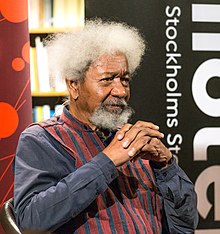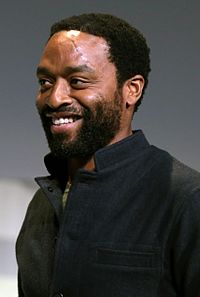Portal:African cinema/Page to screen
Selected screen list[edit]
Selected screen list[edit]
Draft:Portal:African cinema/Page to screen/1 Draft:Portal:African cinema/Page to screen/1
Draft:Portal:African cinema/Page to screen/3
The Blue Elephant (2014) is an Egyptian thriller-horror-fantasy mash-up based on the 2012 eponymous novel by Egyptian writer Ahmed Mourad. The book was the best-selling novel at the Cairo International Book Fair in 2013 and shortlisted for the International Prize for Arabic Fiction in 2014. The director Marwan Hamed was inspired to adapt the book noting “We do not do thrillers and fantasy films in Egypt and I love these genres”.
In adapting his books to film, Mourad said: “The reading audience, which represents two percent of the Egyptian society, is not the same as the cinema audience, which represents 35-40 percent of the Egyptian people. I need to be aware of the required criteria [for adaptation], and I need to view the text as something that is not sacred, susceptible to criticism — change and tweaking to fit the cinema”.
The movie features Karim Abdel Aziz, Khaled El Sawy, and Nelly Karim, among Egypt’s biggest film stars, and follows a troubled psychiatrist who returns to his post at a psychiatric hospital after 5 years following the death of his wife and daughter. Discovering that a patient and old friend is accused of murdering his wife, Yehia becomes enmeshed in a tangled web of mystery as he tries to save his friend and in the process, himself. The film was a box-office success in Egypt and the Arab region and its 2019 sequel Blue Elephant 2 went on to become the highest-grossing film in Egypt. In 2023 Mourad confirmed that a third installment of the franchise was in development.
Draft:Portal:African cinema/Page to screen/5
The Boy Who Harnessed the Wind is a 2019 drama film based on the memoir of the same name by Malawian author and inventor William Kamkwamba and Bryan Mealer. The film starred and was directed by British Nigerian actor Chiwetel Ejiofor. It tells the story of William, who as a young Malawian schoolboy builds a windmill to save his village from drought and famine. The film received praise for Ejiofor’s direction and the performances.
It premiered at the 2019 Sundance Film Festival and began streaming on Netflix in March 2019. It was submitted as the British entry for the Best International Feature Film at the 92nd Academy Awards but was not nominated.
Draft:Portal:African cinema/Page to screen/7

Half of a Yellow Sun is a 2013 Nigerian historical drama film. The film was directed by Biyi Bandele and is based onthe best-selling novel of the same name by writer Chimamanda Ngozi Adichie. Taking place during the Nigerian Civil War (1967-1970), a conflict caused by religious and political differences between the Igbo ethnic group and Muslim Hausa-Fulanis , the film follows the lives of twin sisters Olanna and Kainene from a wealthy Nigerian family as they navigate love, loss and political turmoil.
The film features Thandiwe Newton and Chiwetel Ejiofor and an ensemble cast that includes Onyeka Onwenu, Genevieve Nnaji, Hakeem Kae-Kazim, O.C. Ukeje, Zack Orji, and John Boyega in one of his first film roles. The film, which had a budget of $10 million, the largest for a Nollywood film at that point, was shot across five weeks in Tinapa Studio, Calabar and Creek Town, Nigeria. Bandele listed malaria and typhoid as two of the major challenges of the shoot, with several members of the cast and crew becoming ill, including star Thandiwe Newton. The film received mixed reviews from critics but was nonetheless a box office success, becoming the highest-grossing Nigerian film before it was overtaken by The Wedding Party in 2016.
Draft:Portal:African cinema/Page to screen/9 Draft:Portal:African cinema/Page to screen/9
Draft:Portal:African cinema/Page to screen/11 Draft:Portal:African cinema/Page to screen/11
Draft:Portal:African cinema/Page to screen/13 Draft:Portal:African cinema/Page to screen/13
Draft:Portal:African cinema/Page to screen/15 Draft:Portal:African cinema/Page to screen/15
Draft:Portal:African cinema/Page to screen/17 Draft:Portal:African cinema/Page to screen/17
Draft:Portal:African cinema/Page to screen/19 Draft:Portal:African cinema/Page to screen/19
Draft:Portal:African cinema/Page to screen/21 Draft:Portal:African cinema/Page to screen/21
Draft:Portal:African cinema/Page to screen/23 Draft:Portal:African cinema/Page to screen/23
Draft:Portal:African cinema/Page to screen/25 Draft:Portal:African cinema/Page to screen/25
Draft:Portal:African cinema/Page to screen/27 Draft:Portal:African cinema/Page to screen/27
Draft:Portal:African cinema/Page to screen/29 Draft:Portal:African cinema/Page to screen/29
Draft:Portal:African cinema/Page to screen/31 Draft:Portal:African cinema/Page to screen/31
Draft:Portal:African cinema/Page to screen/33 Draft:Portal:African cinema/Page to screen/33
Draft:Portal:African cinema/Page to screen/35 Draft:Portal:African cinema/Page to screen/35
Draft:Portal:African cinema/Page to screen/37 Draft:Portal:African cinema/Page to screen/37
Draft:Portal:African cinema/Page to screen/39 Draft:Portal:African cinema/Page to screen/39
Draft:Portal:African cinema/Page to screen/41 Draft:Portal:African cinema/Page to screen/41
Draft:Portal:African cinema/Page to screen/43 Draft:Portal:African cinema/Page to screen/43
Draft:Portal:African cinema/Page to screen/45 Draft:Portal:African cinema/Page to screen/45
Draft:Portal:African cinema/Page to screen/47 Draft:Portal:African cinema/Page to screen/47
Draft:Portal:African cinema/Page to screen/49

Kongi's Harvest is a 1970s Nigerian drama film directed by Ossie Davis. The film was adapted from a screenplay by Wole Soyinka's 1965 play of the same name. Produced by Francis Oladele's Calpenny Nigeria Films, it was the first production by a Nigerian indigenous company. The film revolves around the degeneration of personal rule in post-colonial Africa and satirizes the resulting tyranny reflected between a populist politician and a traditional ruler. The film was said to reflect the rising trend of authoritarian one-man regimes in Africa. Soyinka, a Nigerian playwright, poet, and the first African to be awarded the Nobel Prize in Literature in 1986, also starred in the leading role as the dictator of an African nation. At the time of the film's release, Soyinka dissociated himself from the film and denounced the changes that had been made to his screenplay.
Draft:Portal:African cinema/Page to screen/51 Draft:Portal:African cinema/Page to screen/51


